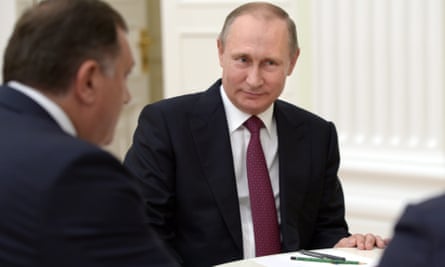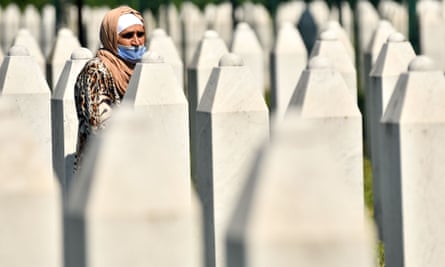
The Bosnian Serb leader accused of risking war by pursuing the breakup of Bosnia-Herzegovina has dismissed the threat of western sanctions and hinted at an imminent summit with Vladimir Putin, saying: “I was not elected to be a coward”.
In an interview with the Guardian, Milorad Dodik, the Serb member of the tripartite leadership of Bosnia-Herzegovina, said he would not be deterred by the outcry from London, Washington, Berlin and Brussels.
Dodik, 62, a key figure in Bosnian politics for 30 years, who was once a favourite of the west, insisted his plans need not lead to the end of Bosnia-Herzegovina. Sanctions and cuts to EU funding would only force him to take up offers of investment from China, Dodik said, and he expected to see Russia’s leader “pretty soon”.
“And I even think that I like that”, Dodik said. “When I go to Putin there are no requests. He just says, ‘what is it I can help with?’. Whatever I discussed with him, I’ve never been cheated on it. I don’t know what else to base trust upon, if not that. With [China’s leader] Xi Jinping, he also says, ‘if there is anything I can help with I am there’.”
Dodik has been widely condemned in recent weeks over his stated intention to withdraw the Serbian part of Bosnia-Herzegovina from state-level institutions, such as the tax administration, judiciary, intelligence agency and even the national army, in order to create a Serb force.
The proposal has been described in a report to the UN as tantamount to “secession”, and a dangerous risk to the 1995 Dayton peace accord, which ended the civil war that cost about 100,000 lives after the breakup of Yugoslavia.
That peace deal established a state, Bosnia-Herzegovina, made up of two entities: the Federation of Bosnia and Herzegovina, consisting predominantly of Bosniak Muslims and Croats, and the Serbian Republika Srpska. Bosnia’s three-member presidency is held by representatives of those three main ethnic groups.
Under the so-called Bonn powers of 1997, substantial powers of law-making were also granted to the office of the high representative (OHR) in charge of implementing the deal. Those powers were used extensively by the former Liberal Democrat leader Paddy Ashdown, during his time as high representative, to centralise the administration of the country.
Most recently, Valentin Inzko, who left the post this summer, used the office to outlaw the denial of genocide, in response to attempts by some people to play down the scope of the 1995 Srebrenica massacre. This led Dodik in July to pull Republika Srpska representatives out of central institutions, and in October to propose taking back powers and transferring land owned by the central state.

Dodik, who has long agitated against alleged changes in the balance of power in Bosnia, said he continued to believe in Dayton but that it had been usurped by “an unelected foreigner” imposing 140 or so laws through the position of the high representative, without a democratic mandate. “All the shit here was made by four unelected foreigners,” he said. “The high representatives and three judges [appointed by the European court of human rights], foreigners, in the constitutional court. They do act as a coordinated criminal enterprise against the constitutional arrangement.”
Since 2017 Dodik has been banned from travelling to the US, or accessing to assets under its jurisdiction, after he defied Bosnia’s constitutional court by staging a referendum on celebrating Republika Srpska Day, marking the date in 1992 when Bosnian Serbs declared their own state in Bosnia.
He recently told Gabriel Escobar, the US deputy assistant secretary, that he “didn’t give a shit” about his threat of further action. Suggestions from Germany of financial sanctions would not deter him either, Dodik said. “Of course, I am not indifferent but I was not elected to be a coward,” he said, speaking in his offices in the Republika Srpska’s administrative centre, Banja Luka.
Plans for taking back powers will be on the agenda at a session of the parliament of the Republika Srpska on 10 December, with Dodik emphasising his determination to see them through after another six-month period of talks. He described his vision of the new arrangement as being no more unwieldy than Belgium’s federal state.

However, he finessed his public position on the most contentious suggestion – of a new Serb army – by proposing other options. The first, he said, would be reducing the current national army by half. “If you don’t want that then we will have no other choice but to adopt, in line with the constitution of Bosnia-Herzegovina, the formation of the army of the Republic of Srpska, or declare the Republic of Srpska a demilitarised republic,” he said. “So there are three options.”
Dodik dismissed as a misfiring joke his recent suggestion that he would surround the national army barracks with Serb forces to push them out, and that unnamed “friends” would rally to his aid should Nato forces intervene.
Once described by the then US secretary of state, Madeleine Albright, as a “breath of fresh air” for his backing of Dayton, Dodik said he had been wrongly portrayed as wanting conflict.
He did not want Bosnia-Herzegovina to fail, but the “delicate balance” of the agreement had been upset, he said, describing Ashdown as being “the worst” offender. “No I don’t want it to collapse. I only want it to exist on the basis of its constitution. If it can’t function that way, then why should it function at all?”
Dodik tapdanced around whether genocide was committed in Srebrenica, where 8,000 Bosniak Muslim men and boys were murdered in July 1995. He said he would not dispute court verdicts on individuals. “No one denies that there was crime there,” he said. “But it’s also true that the story that was told is not the whole truth. An almost identical number of Bosniak Muslims and Serbs were killed. There is no decision there that says genocide was committed by the Serbian people.”
Dodik says he still wants to join the EU, despite consistent rejection from countries such as France and the Netherlands. He met Olivér Várhelyi, the EU’s commissioner for enlargement, three times this week, and was warned of a potential loss of funds. “We are supposed to act like we think that there will be enlargement even though we know there won’t be”, Dodik said. “In the meantime, they do offer some programmes and we do appreciate it – we are grateful. But if you wants to bring us closer, then they should quit putting these conditions on me.”
“I don’t think I’m a bad guy,” Dodik said of the recent furore prompted by the current high representative, Christian Schmidt, warning of an existential threat to Bosnia-Herzegovina. “I think I’m very realistic.”
Guardian , Studeni 2021